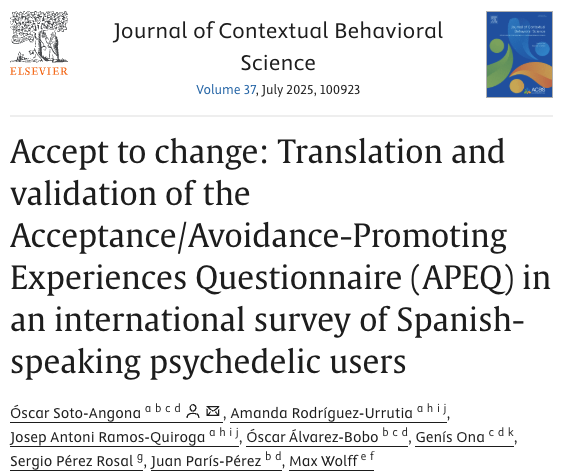Journal of Contextual Behavioral Science (JCBS)
Volume 37, July 2025
Authors
Óscar Soto-Angona, Amanda Rodríguez-Urrutia, Josep Antoni Ramos-Quiroga, Óscar Álvarez-Bobo, Genís Ona, Sergio Pérez Rosal, Juan París-Pérez, & Max Wolff
Key Findings
- The Spanish version of the APEQ shows good validity and internal consistency across diverse Spanish-speaking populations.
- Acceptance-related experiences are associated with therapeutic and growth motives and increased psychological flexibility.
- Avoidance-related experiences are associated with hedonic motives and decreased psychological flexibility.
- Acceptance-related experiences may support change via context-sensitive mechanisms present in psychedelic states.
- High rates of comorbid substance use and mental health conditions were found among naturalistic psychedelic users.
Abstract
Introduction The Acceptance/Avoidance-Promoting Experiences Questionnaire (APEQ) is a theory-based instrument designed to assess acceptance-related (ACE) and avoidance-related experiences (AVE) during psychedelic-induced altered states of consciousness, proposing a model in which these experiences shape psychological flexibility. This study aimed not only to translate and evaluate the psychometric properties of a Spanish version of the APEQ, but also to test its theoretical assumptions and examine contextual and motivational factors modulating therapeutic processes in psychedelic experiences across diverse Spanish-speaking populations. Material and methods An international retrospective survey was conducted in a Spanish-speaking cohort (n = 715) reporting a single psychedelic experience in a therapeutic, ritualistic or ceremonial context involving LSD, psilocybin, ayahuasca, mescaline, MDMA, or ketamine. Participants resided in Spain (n = 420), Latin America (n = 274), or other countries (n = 21). Results The Spanish APEQ demonstrated good construct, criterion and cross-cultural validity, as well as internal consistency across scales and in diverse Spanish-speaking populations. Indicating context-dependency, ACE scores were positively associated with therapeutic and growth-oriented motives and with increased psychological flexibility, whereas AVE scores were associated with hedonic/escapist motives and decreased flexibility. High rates of comorbid mental health conditions and concurrent substance use were observed, reflecting relevant patterns in naturalistic psychedelic users. Conclusion This study supports the validity and reliability of the Spanish APEQ and provides cross-cultural evidence for the context-dependent nature of psychedelic experiences and their psychological consequences. Beyond validation, these findings confirm core theoretical assumptions of the APEQ and suggest that promoting acceptance during psychedelic states may enhance therapeutic outcomes. The observed comorbidities and substance use patterns point to the need for informed risk-reduction strategies in these populations.
